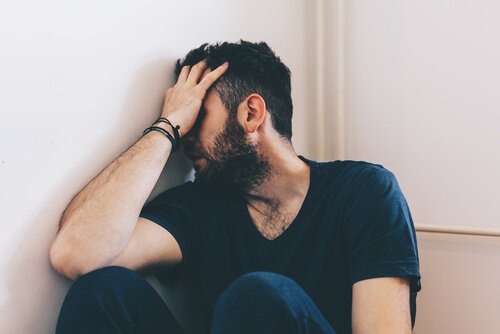Psychological Effects of Domestic Abuse

Abuse always leaves deep scars, and they’re sometimes impossible to erase. The psychological effects of domestic abuse in particular tend to be quite deep, especially if the harm comes from someone you’re in love with.
We should establish the difference between psychic damage and psychological abuse. Psychic damage is the result of a violent act. It consists of the sensations and emotions experienced immediately after being abused. Psychological effects, however, are imprints left in your mind when psychic damage hasn’t been properly treated.
“In any romantic relationship, if they don’t love you, they don’t deserve you, and even less so if they hurt you. If someone hurts you repeatedly without meaning to, then perhaps they do deserve you but they are no good for you.”
-Walter Riso-
Domestic abuse and abuse that takes place within a family are two types of violence that have the greatest impact. There is a deep emotional bond and so the abuse tends to happen for a long time. The worst part is that the abuse is often subtle or condoned by the environment or culture. Therefore, it isn’t even seen as a problem and that’s why it goes on for decades.
Domestic abuse
Domestic abuse can manifest in many different ways. One of the most brutal and painful is the kind that involves physical violence. However, there are many types of abusive behaviors that are almost invisible to outsiders.

Domestic abuse can look like:
- Mockery and ridicule of the beliefs, appearance, or opinions of the abused individual.
- Constantly pointing out mistakes and saying that the abused individual can’t do anything right.
- Manipulation to make them feel guilty. The abuser blames them for not meeting their expectations and then punishes them with silence or anger.
- Denial of the abuse. If the victim tries to talk about it, the aggressor refuses and doesn’t admit to their harmful actions.
- Isolation from friends and family. This includes jealousy and criticism of friends or family.
The common factor in these behaviors is a desire to control. The abuser always attempts to impose themselves on other person, even if they do so subtly. In fact, they don’t need to yell or insult the other person to for it to be domestic abuse.
The effects of domestic abuse
Domestic abuse always has psychological consequences. It leaves marks on the victim’s body, mind, and social life. Although each case is unique and everyone reacts differently, the consequences are more or less the same.

The main effects of domestic abuse include:
- Psychological consequences: Mainly, damage to one’s self-esteem. In fact, people with little self-love have a greater chance of falling into the hands of an abuser. Guilt and hopelessness are very common, as well as anxiety and depression.
- Physical consequences: sleeping problems, digestive issues, headaches, hypertension, and respiratory issues.
- Social consequences: In most cases, the victim isolates themselves. They stop seeing their friends and family, feeling unworthy and ashamed. Of course they’re also trying to not upset their partner, who almost always is suspicious of social gatherings.
It’s important to point out that the situation tends to be a bit more complicated for abused men. Society still has a chauvinistic mentality, and it’s frowned upon for a man to allow his partner to mistreat him.
Thus, men often hide their abuse and even refuse to admit it to themselves. This makes them slightly more likely to develop health issues and addictions as a result of their hidden pain.
What should I do?
Domestic abuse causes a lot of confusion, especially in the beginning. It’s common to have a lot of contradicting feelings, attitudes, and thoughts. You simultaneously love and hate your partner. You feel irritated but at the same time you justify their behavior.
It’s never easy to face the fact that the person you love is also the source of such a serious problem. It’s hard to admit that maybe the only way out is to leave them. This all forms part of the perverse dynamic of domestic abuse.

The hardest part about getting out of this type of situation, which is always very harmful, is taking the first step. The first step is admitting and accepting that you’re in an abusive relationship.
Once you’ve accepted it, the next step is to face the fact that it’s not going away on its own. Therefore, you need to ask for help. Ideally, you’d look for a psychotherapist, since there are probably very deep issues involved.
This text is provided for informational purposes only and does not replace consultation with a professional. If in doubt, consult your specialist.








